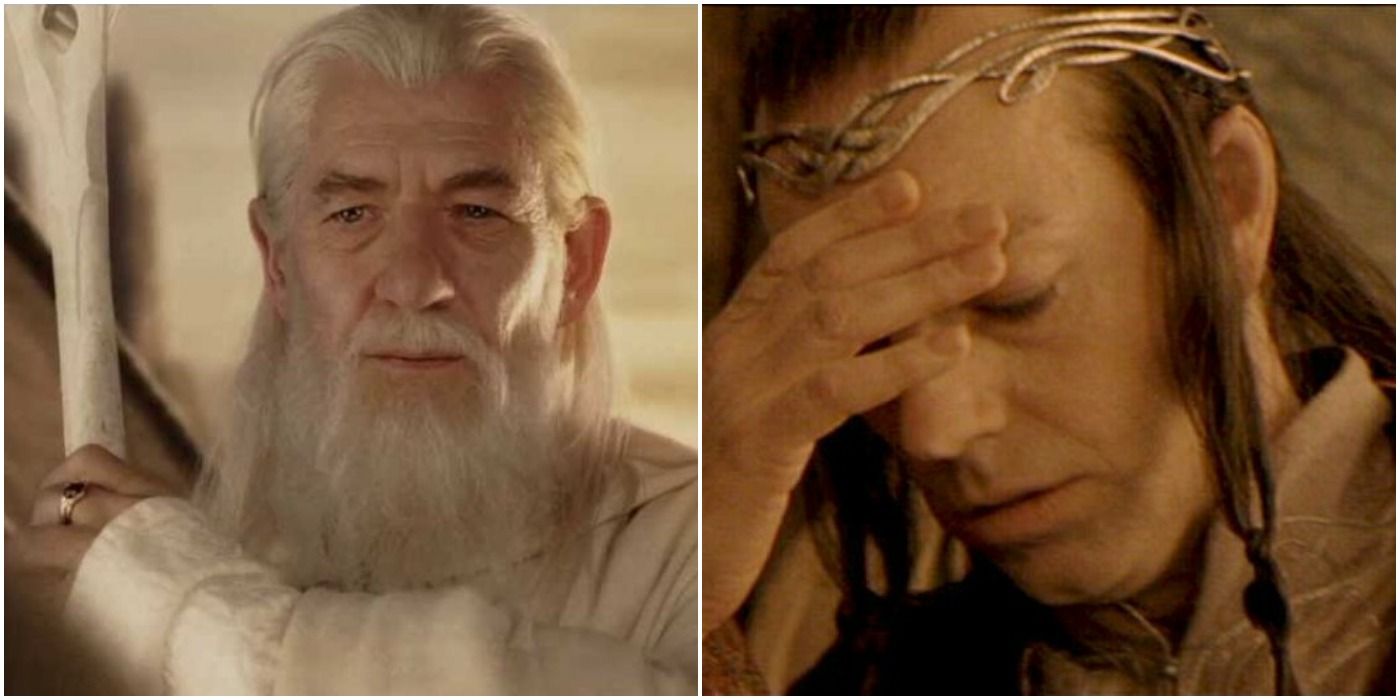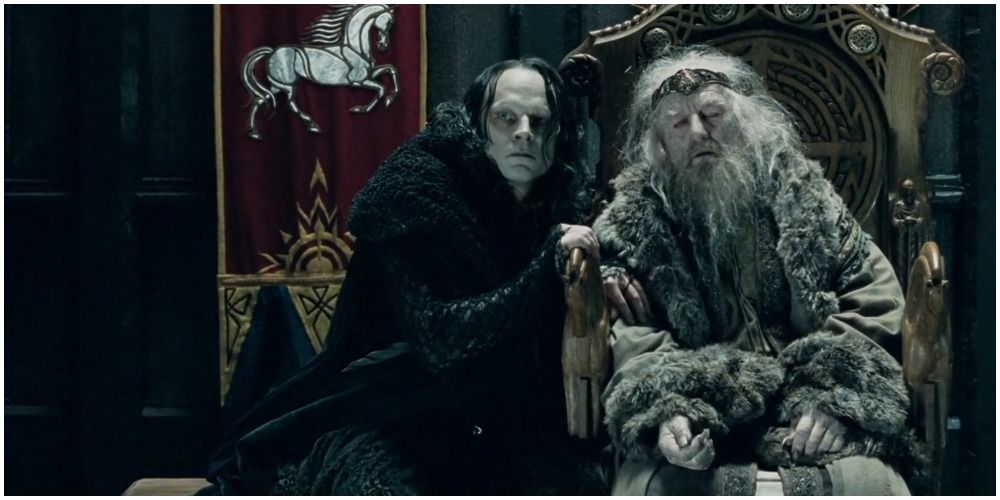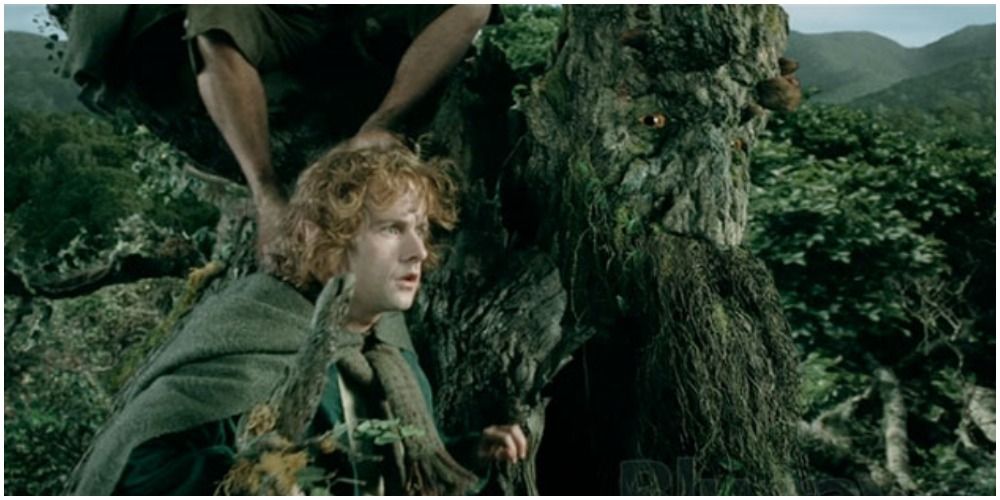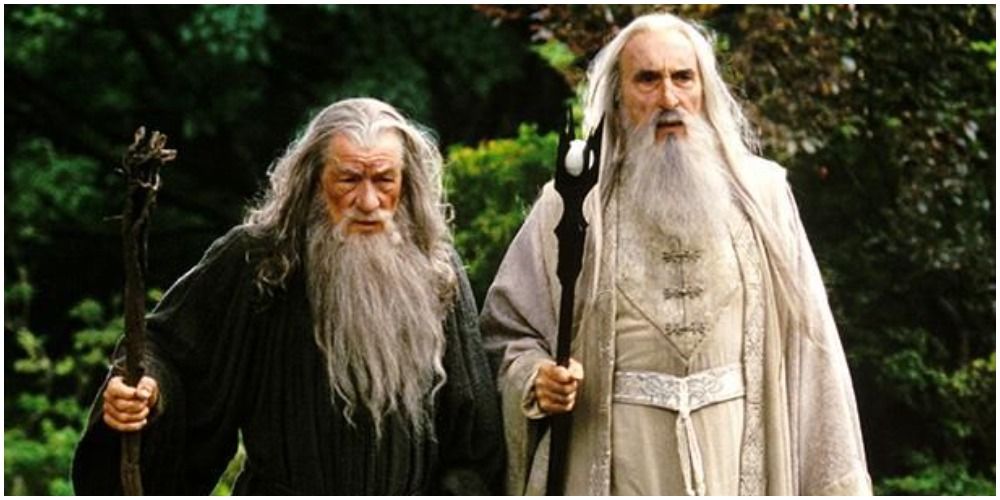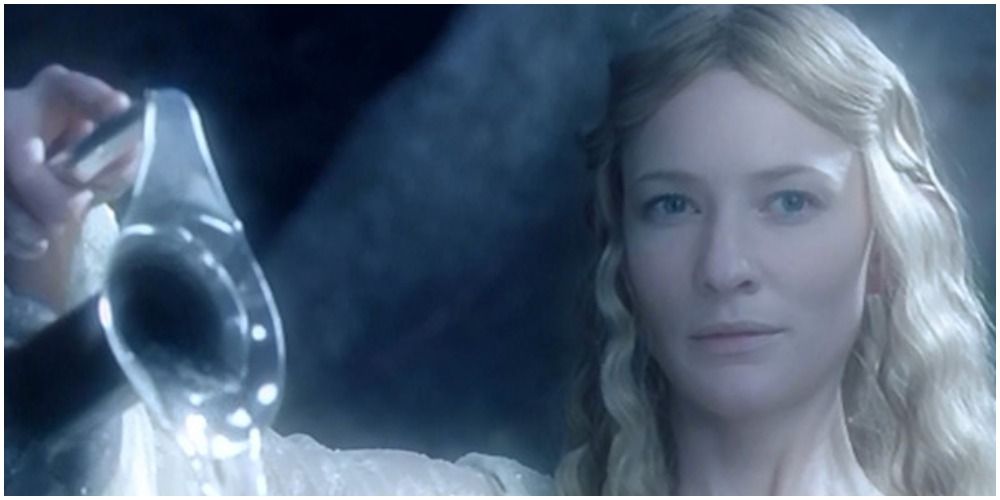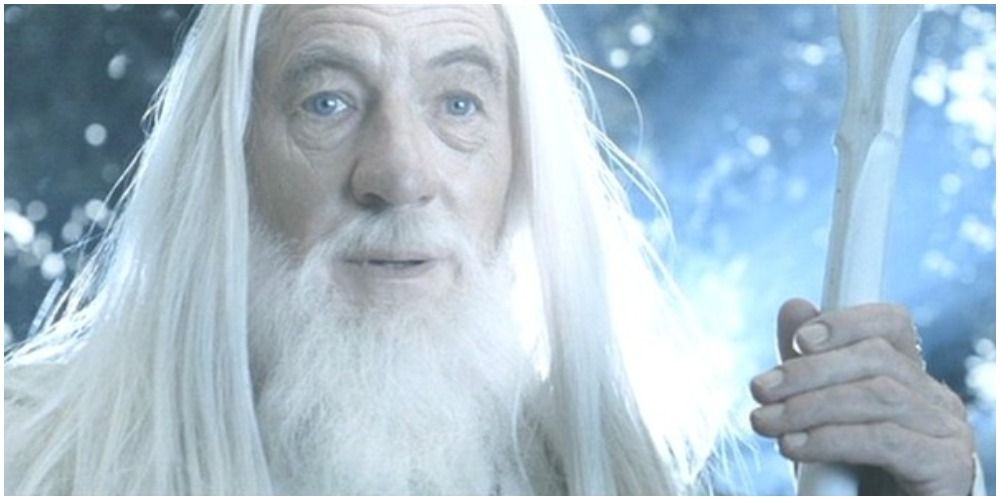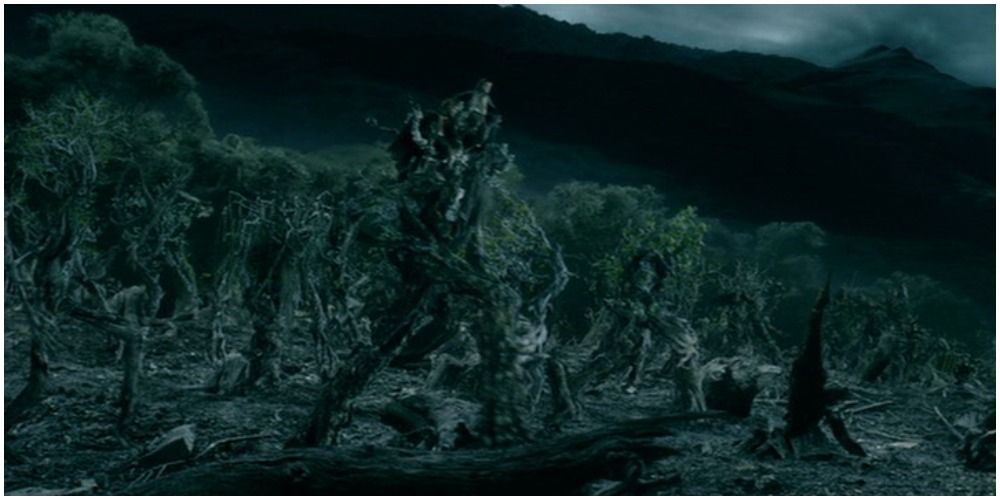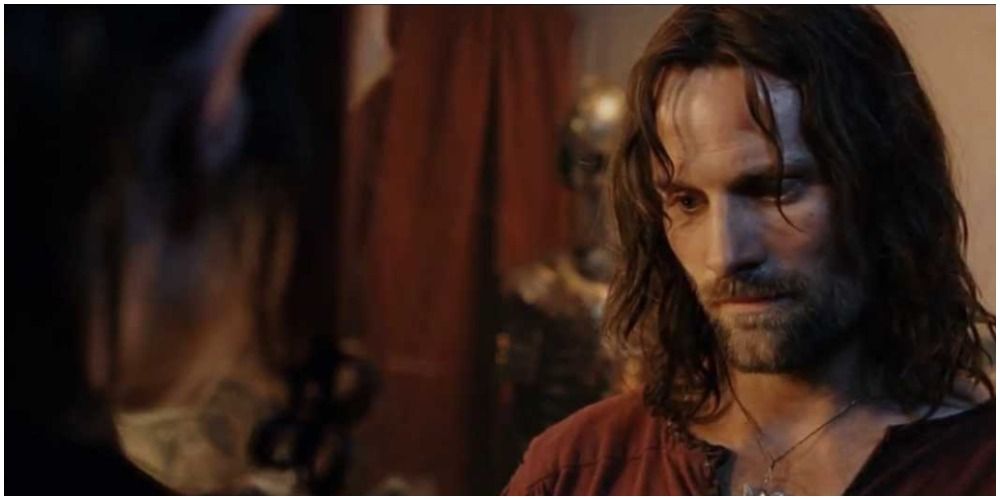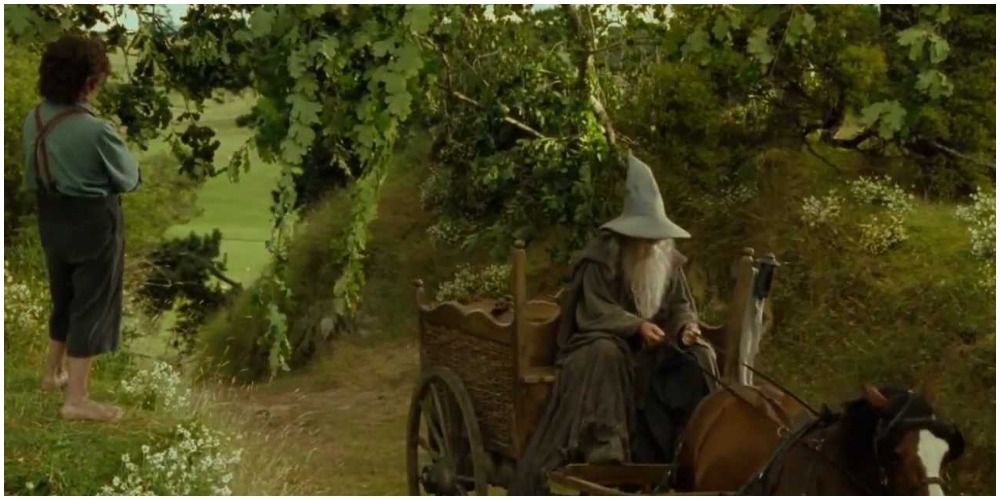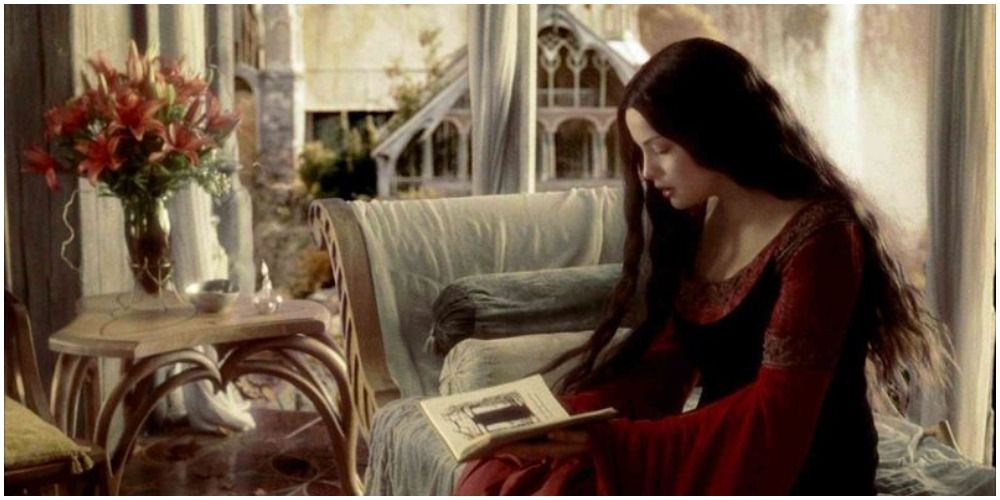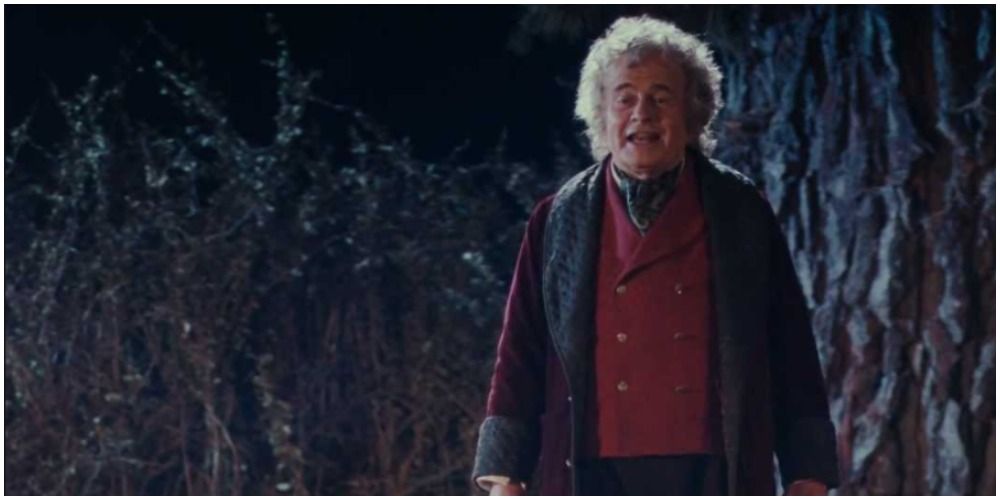The Lord of The Rings films are some of the most successful fantasy works of all time and for good reason. Taking place in one of the genre's most influential worlds, the trilogy chronicles multiple epic journeys and introduces both iconic heroes and terrifying foes, all while demonstrating a great deal of heart. Considering the films' setting in the quasi-medieval world of Middle Earth, it makes sense that the characters' speech patterns aren't exactly in line with those of contemporary audiences.
But nonetheless, there are many memorable quotes from the films that stand out as particularly puzzling. Whether they are convoluted jokes, speeches littered with archaic terms, or statements that seem downright suspect, these iconic lines from the trilogy are remembered precisely for how baffling they are.
"Ill News Is An Ill Guest."
Grima Wormtongue issues this proclamation when Gandalf, Aragorn, Gimli, and Legolas arrive at Edoras, the capital of Rohan, to warn Théoden of Saruman's impending Uruk-hai attack. Although it rolls off the snaky advisor's tongue and the possessed king eats it up, this quote clearly makes no sense.
With Gandalf and company having come to Rohan to initiate an evacuation, they're clearly not "ill guests," even if Théoden were to only care about his own life and not his people's. If a king never accepted ill news, that king wouldn't last very long - which happens to be precisely what Saruman's crony wants.
"The Closer We Are To Danger, The Farther We Are From Harm."
When Treebeard discovers Merry and Pippin in Fangorn Forest, they're terrified by the Ent until they manage to convince him that they're hobbits and not orcs. Pippin convinces Treebeard to bring them south (towards Isengard) with this line.
Although it sounds wise when he says it, it's a tactic that happened to work for him and Merry but not always an accurate or advisable stance. Treebeard even admits it doesn't make sense to him, and that's probably because the line is a means of getting Treebeard to see the devastation Saruman caused to the forest to spur the Ent leader into action.
"All These Years It Was In The Shire, Right Under My Very Nose."
Gandalf is an Istari, a spiritual being sent to Middle Earth to assist in the fight against Sauron using great wisdom. A question that lingers in fans' minds, then, as exemplified by a rather shocking line of dialogue, concerns Gandalf's ignorance of the location of the One Ring.
When he visits Saruman in The Fellowship of the Ring, Gandalf admits that he never realized Bilbo's ring was the same, all-powerful one created by Sauron. The question of how a wizard whose insight transcends that of mortals could fail to put two and two together - or to at least suspect that Bilbo's ring was worth investigating - for more than 50 years is pretty baffling.
"I Pass The Test. I Will Diminish, And Go Into The West, And Remain Galadriel."
For fans of the films who aren't versed in Tolkien's books, this famous line from Galadriel requires some context to make any sense. She delivers it after Frodo offers the ring and she momentarily appears to the hobbit as a terrifying ruler empowered by the ever-important piece of jewelry.
Although her backstory isn't entirely consistent in Tolkien's other writings, The Silmarillion reveals that Galadriel has been banned from the Undying Lands and believes she can never return. But having overcome the temptation to use the ring even in an ostensible fight for good - and to likely transform into a different being altogether - Galadriel senses her ban has been lifted. This means she can forfeit her rule in Middle Earth to return home.
"Gandalf? Yes... That Was What They Used To Call Me."
In The Fellowship of the Ring, Gandalf appears to meet his end at the hands of the Balrog. First-time viewers might suspect the wizard has died, but in The Two Towers, he makes a shocking return in a spiffy new costume. He explains that he died in defeating but the monster, but was returned to Middle Earth to complete his mission, and implies that his time away felt like several lifetimes.
But the books specify that the wizard was only gone for 19 days. If his memory was restored enough to recognize Aragorn, Legolas, and Gimli, why would he only faintly remember his own name?
"We Lost The Entwives . . . And Now, We Cannot Find Them. I Don't Suppose You've Seen Entwives In The Shire?"
The Ents are a unique species in Middle Earth, who clearly boast power and intelligence but exercise these faculties at an extremely slow pace. When Treebeard encounters Merry and Pippin in The Two Towers, he drops the bomb that all the female Ents are gone. When Pippin assumes they've died, Treebeard corrects him, clarifying that they've somehow been lost.
It's a light-hearted moment that's played for laughs, but it's still mystifying how half the species could suddenly disappear when so much is made of their glacially slow pace.
Elrond's Prediction
"Here you will dwell, bound to your grief, under the fading trees, until the world has changed and all the long years of your life are utterly spent."
Elrond issues this proclamation as Arwen decides whether to leave for the Undying Lands or to remain, mortal, in Middle Earth in the hope that Aragorn will survive the war. Elrond warns her that Aragorn will inevitably die and she will outlive him, grief-stricken.
But in Tolkien's appendices, readers discover that Arwen dies only a year after her husband. Although the film indeed depicts a widowed Arwen departing to an abandoned Lorien to live out the rest of her days, Elrond confusingly implies that she will endure a far longer period of grief than she truly will.
"A Wizard Is Never Late, Nor Is He Early. He Arrives Precisely When He Means To."
This is one of Gandalf's first lines in The Fellowship of the Ring, and also one of his most bemusing. Of course, since things do work out in his and Frodo's favor in the end, with the quest to destroy the One Ring a hard-fought success, it could seem like Gandalf is correct in the end. He does, after all, show up to Helm's Deep with Éomer and his soldiers in tow exactly on time.
But not long after he issues the famous line, Gandalf is taken captive by Saruman and is a no-show at his planned meeting with Frodo, Sam, Merry, and Pippin at the Prancing Pony in Bree. Once he escapes from Isengard, he heads to the bustling inn but has of course missed the hobbits.
"As Sauron's Power Grows, Her Strength Wanes. Arwen's Life Is Now Tied To The Fate Of The Ring."
Elrond speaks this line to Aragorn when he gifts the ranger Anduil, a powerful and very old sword. But why would Arwen's life and strength be tied to the ring any more than any other resident of Middle Earth? It seems like Elrond is suggesting that since Arwen has chosen a mortal life, she will die if Sauron wins (as will everyone else who opposes him) - a situation that seems increasingly likely.
But that doesn't explain why she''d be getting physically weaker as Sauron gets stronger. It's an unexplained and unjustified statement that was probably included for dramatic effect.
"I Don't Know Half Of You Half As Well As I Should Like, And I Like Less Than Half Of You Half As Well As You Deserve."
Bilbo's monologue at his 111th birthday is one of The Fellowship of the Ring's most iconic scenes - and a fantastically funny way to open what will develop into quite the dark epic. This memorable line is couched in the speech that Bilbo delivers right before slipping the ring on his finger and disappearing right in front of the partygoers' eyes.
The convoluted dig draws a hilarious silence from the crowd as they puzzle over its meaning. Not only does it introduce viewers to Bilbo's snarky wit; it also reflects his desire to leave the Shire for good.

